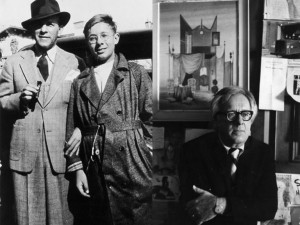Ray Bradbury (1920-2012)
In his reference book The Great American Broadcast, author Leonard Maltin relates an anecdote of how future science-fiction/fantasy author Ray Bradbury talked himself into a “job” on George Burns & Gracie Allen’s radio show. The brash youngster, fourteen at the time, coaxed straight man Burns into letting him and a friend attend the comedy duo’s broadcasts, and shortly after that he began to turn in a weekly script for them. “He was incredibly kind to me, read my dreadful Burns and Allen scripts, said they were great, said I was a born writer.” (Bradbury, in telling the story many years later, informed Maltin that not only did the couple eventually use one of his routines, but in 1982, at an awards ceremony honoring Steven Spielberg, he related the story of his apprenticeship to the audience…and had Burns rush over to him when it was done, saying: “Was that you? Was that you? I remember you!”)
Bradbury never became a permanent part of the Burns and Allen writing staff (they had John P. Medbury…but no Bradbury), but his participation in radio would become quite prominent once Ray began making his first short story sales to magazines in the 1940s. Bradbury recounted to Maltin that he finally summoned up the gumption to contact William Spier (the producer of Suspense) about selling him some of the stories he had written for Weird Tales magazine…and Spier graciously invited him over to the house to discuss the prospect, where the author would drink cocktails and rub shoulders with the likes of Orson Welles, Agnes Moorehead and Ava Gardner. “Radio’s outstanding theatre of thrills” used quite a few Bradbury tales on the anthology program, including “Riabouchinska,” “The Screaming Woman,” “The Crowd,” and “Kaleidoscope.” Other shows that availed themselves of Ray’s talent include The Molle Mystery Theatre, Radio City Playhouse, The CBS Radio Workshop, NBC Short Story…and Suspense’s “sister” show, Escape.
It would be the science-fiction radio programs Dimension X (1950-51) and the later X-Minus One (1955-58) that would make full use of the Bradbury library, presenting such tales (often adapted on both programs) as “There Will Come Soft Rains,” “The Veldt,” “Marionettes, Inc.,” “And the Moon Be Still as Bright,” and “Mars is Heaven.” One of Bradbury’s classic stories, “Zero Hour,” not only appeared on both of the “X’s” but on Suspense and Escape as well. In the 1970s, the short-lived science-fiction radio drama Future Tense had a go-round at “Zero Hour” (as well as “Mars is Heaven”). In 1981 National Public Radio presented Bradbury 13, a series of thirteen dramatic broadcasts that adapted more of the author’s stories like “Dark They Were, and Golden-Eyed” and “A Sound of Thunder.” (This anthology was the recipient of a Peabody Award.)
Hearing of Bradbury’s passing at the age of 91 on June 5, I mentioned the news to my parents…and my mother said solemnly, “I don’t think I’ve ever read anything by Bradbury.” My response to this was that I read everything of his I could get my hands on: his large number of short stories (he wrote nearly 600) in collections like Dark Carnival (which contained Bradbury’s classic chiller, “The Small Assassin”—a tale that kept me awake at night for a week), The Martian Chronicles, and The Illustrated Man; plus novels like Fahrenheit 451 and Something Wicked This Way Comes. To say Ray’s writing was an influence on me would be a mild understatement—in some ways, I’m a writer because I fell in love with his work (I even did my high school English class research paper on him). His incalculable prose has also been adapted for comic books, movies (the 1953 monster film The Beast from 20,000 Fathoms is based on Bradbury’s “The Fog Horn”) and TV shows (The Twilight Zone, Alfred Hitchcock Presents)—notably The Ray Bradbury Theater, an anthology featuring dramatic adaptations of his stories that was seen on the HBO and USA networks from 1985 to 1992.
Before his death, Ray Bradbury had already decided on his epitaph: his headstone will read “Author of ‘Fahrenheit 451.’” This does the man somewhat of a disservice—his works were science-fiction based, but they also contained elements of fantasy, horror…and even humor; his short stories will still be read by generations after his passing, and many of them were the basis of some of the best radio drama ever broadcast. He made the sci-fi genre “respectable,” argues author Ted Gioia in a Salon tribute. “Bradbury was much more than a teller of high-tech tales. No science fiction author of his generation had a more polished or more poetic prose style — a skill that stood out all the more given the slapdash sentences of his pulp fiction contemporaries. But Bradbury’s greatest skill was his ability to inspire readers to reflect deeply on our society and values, even when his books dealt with Mars or the future or some other tried-and-true genre concept.”
R.I.P., Ray Bradbury…you will be sorely missed.



Delighted to run across this story. I’m both a Ray Bradbury fan (small collection of choice volumes, a couple autographed, but also recordings of him reading his material) and an Old Time Radio fan (especially “The Bickersons” and Stan Freburg).
I started reading Bradbury stories aloud to my grandmother and high-school girlfriend when I was about 16. Eventually recorded the entire 884-page _Stories of Ray Bradbury_ for a local Portland broadcast service for blind and elderly housebound listeners. I’m likely the only person on the planet who has read _Something Wicked This Way Comes_ aloud, cover to cover, four times.
A little surprised that you didn’t mention a superstar of old time radio, Jack Benny, also grew up in “Green Town” (Waukegan) Illinois, especially since he regularly mentioned that fact on his show.